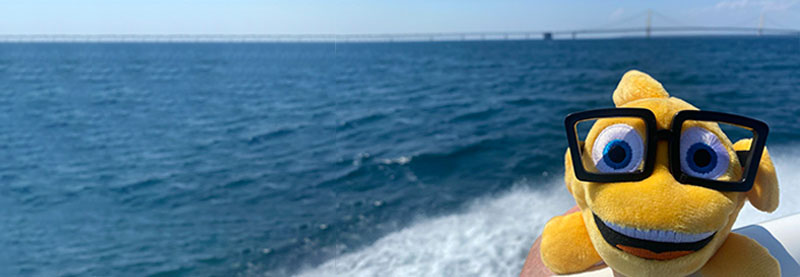Intellectual Property Insights from Fishman Stewart
Mini Article – Volume 23, Issue 10
Share on Social

World Ocean Day and Patents Powering the Tide of Change
By Kristyn Webb
June 8th is World Ocean Day which raises awareness about the importance of the oceans and encourages conservation efforts to protect marine ecosystems. Since this is a topic very near and dear to our beloved mascot Finny, we are taking a moment to highlight some of the game changing inventions designed to keep our oceans clean.
US8795519B2 describes a method and system for cleaning up oil spills, like what occurred in the 2010 Deepwater Horizon disaster. The invention seeds the spilled oil with tiny magnetic particles and then uses a boom to create a magnetic field to manipulate the oil spill for better cleanup.
The invention of US20230084588A1 is another play on magnetism for use in cleaning up oil spills. The disclosed magnetic nanoparticle coating turns a normal, everyday sponge into a “smart sponge”—an oil absorber that can suck up and store more than 30 times its weight in oil until wrung out or otherwise safely decontaminated and then reused.
Species of oil-eating bacteria occur in nature, and some are man-made. For example, in the 1970’s, Ananda M. Chakrabarty developed a new genetically engineered strain of the Pseudomonas bacteria, now known as Pseudomonas putida, that has the ability to break down hydrocarbons found in oil. He filed a patent with the US Patent Office but was initially rejected on the basis that a living organism could not be patented. He appealed the rejection, and it eventually landed in front of the US Supreme Court which ruled in his favor, establishing a precedent that genetically engineered living organisms could indeed be patented. This decision had far-reaching implications for the biotechnology industry, opening the doors to the patenting of genetically modified organisms and stimulating further advancements in the field.
In honor of World Ocean Day, we are offering for sale Finny NFTs. Any proceeds will go to support The Ocean Conservancy.
Kristyn Webb is the Group Leader of Fishman Stewart’s Copyright Practice Group, and is currently earning a Master’s Degree in Copyright Law at King’s College London.

Published June 2, 2023


Related Content from Fishman Stewart
People have long pondered whether or not the Giza pyramids were indeed solely burial chambers, which was the only known, and archaeologically determined, use—until now.
By 1930, efforts began in New York to replace Mother's Day with Parent's Day because men were more than just breadwinners. Those efforts didn't catch on, probably because in that era, women often spent more time in the home.
In February, Nike and Skims announced that they will be working together on a new brand, NikeSkims. The co-brand will create a new line of training apparel, footwear, and accessories specifically designed to meet the unique needs of women athletes.
Generally, federal courts have exclusive jurisdiction over copyright cases, and often, this presents an insurmountable paywall for individual artists and small businesses to vindicate their rights, especially where the value of the individual copyrighted works are relatively low.
Dedicated to raising public awareness about the importance of encouraging innovation and creativity throughout the world, the World Intellectual Property Organization (WIPO) annually observes World Intellectual Property Day on April 26 to showcase the role that patents, trademarks, industrial designs, copyrights and trade secrets play in our everyday lives.
Hold onto your foam fingers, sports fans – college sports just got a whole lot more interesting! The latest updates to Name, Image, and Likeness (NIL) rules are making student-athletes bigger than ever, and it’s not just about the game anymore.
Did a federal court in Louisiana recently decide that US copyrights are global rights? It seems so.
One of his most famous songs, “Lose Yourself” was recently at the center of a lawsuit. In 2019, Eminem’s publishing company Eight Mile Style sued Spotify claiming that Spotify streamed a number of its musical compositions without proper licenses.
One of the most common challenges is whether AI should be free to train on data that is protected by copyright and owned by third parties without first obtaining permission.
The U.S. Copyright Office (USCO) recently published its latest report on AI and “copyrightability.” In short, the USCO considers only some AI-generated works to be sufficiently creative as to deserve copyright protection, and thus, registration.
IDENTIFYING, SECURING AND ADVANCING CREATIVITY®












